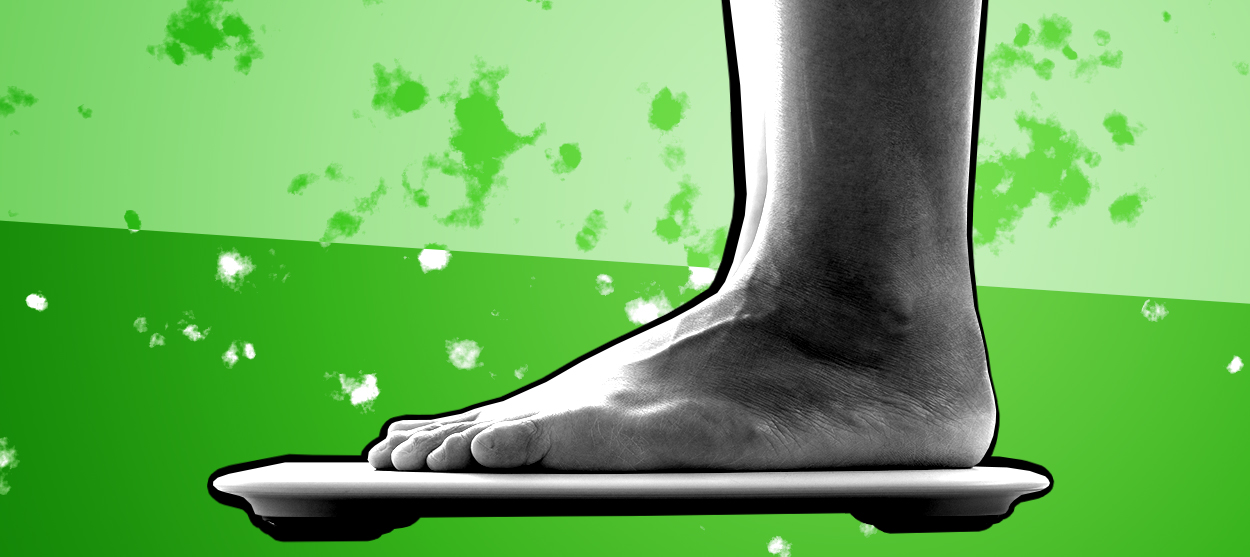January is the month of body shaming. I'm tuning out.
I refuse to beat myself up this year


A free daily email with the biggest news stories of the day – and the best features from TheWeek.com
You are now subscribed
Your newsletter sign-up was successful
I used to make New Year's resolutions. Well, one resolution specifically. For most of my adult life, I've been unhappy with the size of my body, and disappointed by the numbers on my bathroom scale. So every year, I would vow to myself come January 1st that this would be the year. The year I lost the weight, and kept it off.
If American news media is to be believed, I'm firmly in the majority. On lists of the most popular New Year's resolutions, "lose weight" is almost always at or near the top. And it often shares space with its cousins, like "get in shape" and "eat healthier," which seem innocuous and even empowering on the surface — but what are we really picturing as the outcomes of those goals? More often than not, the mental image is the same: a visibly slimmer body.
If December is the supposed month of excess, then January has been anointed the time of penance for those excesses. The food media I consume has once again turned its attention from sugary, fatty treats to demure portions of vegetables; the health-and-wellness publications I follow are chock-full of diet tips and fitness trends. The implication is that we're not doing these things because we take delight in them; we're doing them to offset the damage of the season before. And even places that usually eschew talk of bodies and weight will slip in casual comments about holiday-related waistline growth, and the need to trim that right back down.
The Week
Escape your echo chamber. Get the facts behind the news, plus analysis from multiple perspectives.

Sign up for The Week's Free Newsletters
From our morning news briefing to a weekly Good News Newsletter, get the best of The Week delivered directly to your inbox.
From our morning news briefing to a weekly Good News Newsletter, get the best of The Week delivered directly to your inbox.
It's no secret that America has a puritanical streak, where the sins of the flesh — say, indulging in foods deemed morally unworthy — must be corrected via deprivation and discipline. This plays right into what intuitive-eating advocates refer to as "diet culture," an all-encompassing paradigm that equates morality with health, health with weight loss, and weight loss with dieting. And so "New Year's resolution" is all too often synonymous with "diet resolution," and thus with "weight-loss goal."
For people like me, wrestling with a history of disordered eating, this makes January a particularly exhausting time of year. As someone whose eating-disorder recovery is still relatively new and fragile, I've had to cut myself off from most of my usual food-and-culture media consumption — even outlets I otherwise like and trust — because of the pervasiveness of casual weight-loss talk. Even while researching this column, I had to be very careful about which headlines I read and which ones I scrolled past.
Even for people who don't share my fraught relationship to food and body image, the pervasive focus on resolutions-as-weight-loss-goals is an unwelcome reminder of the blurry line between "taking care of one's body" and "striving to shrink one's body size." We've come a long way since 2011, when writer Lindy West announced "Hello, I Am Fat" as if it were a public provocation. There have been chips made in the wall — the increasing visibility of larger bodies in American media, the rise of anti-diet narratives and movements like Health at Every Size. But the monolithic notion that "health" equals "thinness," and "getting healthy" means "losing weight," stands. And the moral judgment of fat bodies — particularly, though not exclusively, fat women's bodies — remains remarkably persistent, year after year.
It's easy to suggest opting out, and focusing on other methods of measuring health — muscle strength and tone, absence of pain and fatigue, feelings of fullness and well-being after meals. But even these things are fraught; when I recently Googled "anti-diet," the third result was a SELF Magazine article proclaiming it "the healthiest diet you could ever be on" — as if there were simply no way to pursue health without being on some sort of diet, even one that rejects the notion of dieting altogether.
A free daily email with the biggest news stories of the day – and the best features from TheWeek.com
We are steeped in a cultural narrative that relentlessly brings discussions of health back to systems of eating, and thus to deprivation, and thus to the shrinking of bodies. New Year's resolutions are just one of many ostensibly wellness-related phenomena that have become Trojan horses for body-shaming and fatphobia. Plenty of ink — virtual and literal — has been spilled about the harm done by this mindset, and whether long-term weight loss is even possible, let alone beneficial.
I'm not interested in rehashing those arguments here; I am not trying to make a case against dieting, or weight loss, or New Year's resolutions. I am simply a person with a body I don't always take care of as well as I could, and habits I struggle to find the motivation to change. I feel the clean-slate energy of the new year, and wonder whether it's possible to set intentions for the health of my body — not its size, or its appearance, but its health — without getting sucked back into a cycle that's done me so much harm for so long.
After so many years of resolving to lose weight, I've given up on making New Year's resolutions, at least for now. For me, it's safer to step fully away from the hamster wheel, rather than trying to run in the opposite direction. I have friends who have taken varied approaches to the challenge of setting health-and-wellness intentions without falling into the diet-culture trap: choosing an aspirational word to organize their year around, or a physical accomplishment to tick off their list by the end of the year. Some are totally comfortable making resolutions focused around improving physical fitness or rebalancing food intake, without the associated assumption that their bodies will shrink in the process.
I'm not there yet; the droning of diet culture in January is still too loud for me. But in the meantime, I've stopped beating myself up for entering each new year dissatisfied with the body I have, and have given up trying to shrink my body size in the name of health. It's a step towards reclaiming the intention-setting of the new year, in a way that strengthens my body rather than shaming it.
Want more essential commentary and analysis like this delivered straight to your inbox? Sign up for The Week's "Today's best articles" newsletter here.
Zoe Fenson is a freelance writer based in the San Francisco Bay Area. Her writing has appeared in Longreads, Narratively, The New Republic, and elsewhere. When she's not writing, you'll find her doing crossword puzzles in cocktail bars or playing fetch with her cat.
-
 How the FCC’s ‘equal time’ rule works
How the FCC’s ‘equal time’ rule worksIn the Spotlight The law is at the heart of the Colbert-CBS conflict
-
 What is the endgame in the DHS shutdown?
What is the endgame in the DHS shutdown?Today’s Big Question Democrats want to rein in ICE’s immigration crackdown
-
 ‘Poor time management isn’t just an inconvenience’
‘Poor time management isn’t just an inconvenience’Instant Opinion Opinion, comment and editorials of the day
